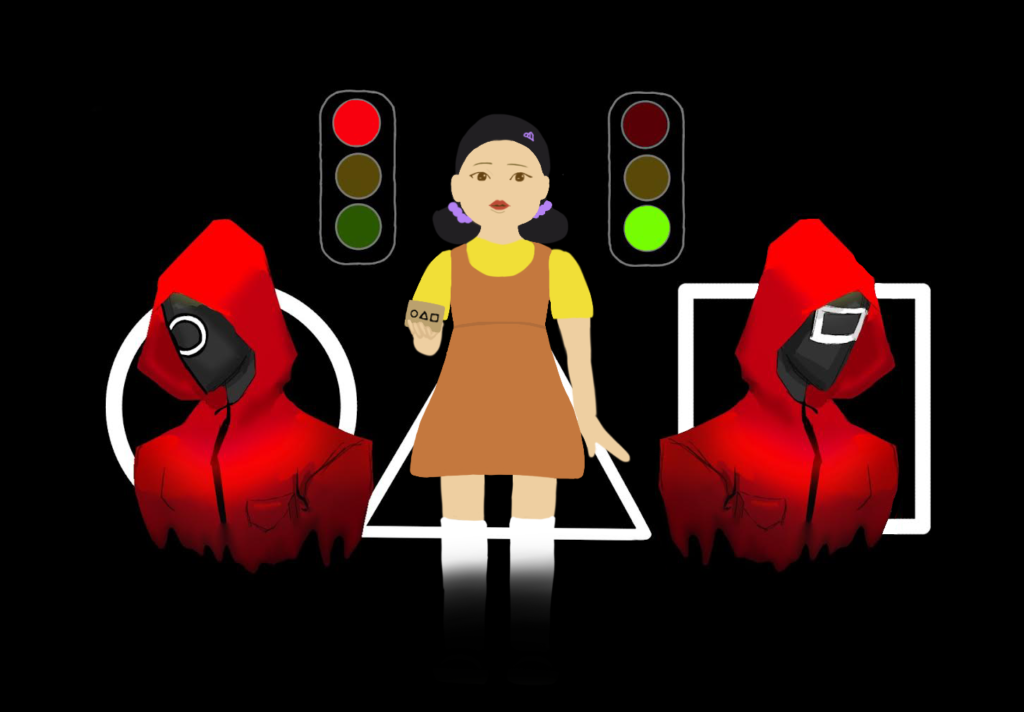
On September 17, Netflix released a new Korean drama called Squid Game. The show rapidly accumulated popularity, becoming Netflix’s biggest international hit. The show’s widespread hype quickly reached Townsend Harris as students rushed to watch the globally-esteemed fictional game show.
Squid Game revolves around concepts of greed, desperation, and human nature by portraying its characters as avaricious people who desperately seek to financially secure themselves. The Korean psychological thriller features actor Lee Jung-jae who played Seong Gi-hun, a divorced father living in poverty with his mother. He wants to live happily with his daughter, but whatever money he gains he quickly gambles away or loses to brutal loan sharks. With no options left to end these ties, he meets a man in the train station who gives him a business card to participate in the opportunity of a lifetime— a game that offers a heap of cash. However, this game is not what it seems. The stakes are life-threatening as the characters fight to survive each of the six games and hopefully win a grand sum of 4.56 billion won.
Harrisites agree that the series strongly conveys overlapping themes of desperation and morality. Squid Game “shows how much of a grasp money has on society, especially those in the lower class,” said junior Stella Cho. “The lower class were willing to risk their own lives and kill others so they could escape the hell that they live in,” she added.
Senior Nadia Santo agreed and said that the drama highlights “the inability for people in debt to get themselves out of poverty, so desperate to make ends meet that they’d rather all go back to the games and risk their lives. Having a chance [at playing the games] is better than struggling to live in the outside world, [which] is a terrifying sentiment that many may resonate with.”
Many Harrisites agree that the show’s writing, production, and acting are phenomenal. Freshman Xavier Murphy brought up the astounding “character progression and the emotional connections the audience had to the characters.” Stella proclaimed that Harrisites can learn a lot from the show, including the message that “money can solve many problems, [but] it does not promise happiness, so don’t compromise your morals for it.”
Many Harrisites particularly resonated with the characters and their individual values, as well as many other elements that the show offers. When asked about their favorite character in the show, Stella said, “My favorite character was [Kang] Sae-byeok as she was one of the only characters who hadn’t made selfish economic decisions that impacted her loved ones. The reason she needed money was to help the rest of her family escape North Korea and to provide for her family.”
Additionally, Nadia said, “If I have to pick just one [favorite], it would be Gi-hun. He struggles with handling life as a dad, taking care of his mother, and just taking care of himself, but as the show goes on, we get to know him as this optimistic and caring human being with a heart of gold and good intentions.” Meanwhile, Xavier stated, “I can relate to the element of having trust issues because there have been times people have betrayed me for their own benefit.”
Harrisites were entranced by Squid Game’s commentary on greed, human nature, and socioeconomic status throughout the series. From desperation to dystopia, this ultra-popular Korean drama infatuated global audiences and left millions on a cliffhanger, pondering if another season is to be released in the near future.
Artwork by Andy Chen and Jialin Chen




























